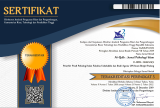The Effect of Self-Efficacy on the Self Directed Learning of Junior High School Students
Abstract
Abtract: The beginning of the first year at the junior high school level is a very difficult moment for many students because students have to many challenges such as: changes in the school environment, cognitive, psychological and social. This challenge requires students to be able to excel academically in terms of student learning independence or self-directed learning, namely the ability of students to understand lessons, set learning strategies, self-regulate, and evaluate their performance, which has an impact on decreasing learning success. The purpose of the study was to see the effect of self-efficacy on the self-directed learning of junior high school students. The sample of this study was class VIII students with a total of 105 students using random sampling technique. The method used is descriptive analysis and simple linear regression. The results showed that self-efficacy affects self-directed learning of junior high school students.
Keywords
Full Text:
PDF (Bahasa Indonesia)References
Andrews, C., & Bishop, P. (2012). Middle grades transition programs around the globe " Effective school transition programs take a comprehensive approach to ensuring student success in the middle grades. Middle School Journal, 8-14.
Azwar, S. (2014). Reliabilitasn dan Validitas (edisi 4). Yogyakarta: Pustaka Pelajar.
Bartsch, R., Case, K., & Meerman, H. (2012). Incerasing academic self-efficacy in statistics with a live viacirous experience presentation. Teaching of Psychology, 39(2) 133-136.
Desmita. (2016). Perkembangan Peserta Didik. Bandung: PT. Remaja Rosdakarya.
Douglass, C., & Morris, S. R. (2014). Student Perspectives on self-directed learning. Journal of the Scholarship if Teaching and Learning, Vol 14, No.1, 13-25.
Firdaus, F. M., Pratiwi, N. A., Riyani, S., & Utomo, J. (2021). Meningkatkan kemandirian belajar peserta didik sekolah dasar dengan menggunakan Model SOLE saat pandemi Covid-19. Foundasia, 1-8.
Fuadi, A. (2013). Prestasi akademik siswa sekolah menengah pertama ditinjau dari konsep diri akademik dan kecerdsan emosi. Yogyakarta: Universitas Gadjah Mada.
Guiffrida, D., Lynch, M., Wall, A., & Abel, D. (2013). Do reasons for attending college affect academic outcomes? A test of a motivational model from a self-determination theory perspective. Journal of College Student Development, 54, 121-139.
Hiemstra, R., & Brockett, R. (2012). Reframing the meaning of Self Directed Learning : An Updated Modeltt. Adul Education Research Conference (pp. 155-161). Kansas: Kansas State University Libraries.
Hogan, S. (2012). Stimulating autonomous learning environments: considering group efficacy as Mediating the Relationship Between Perceived Autonomy Support and Self-Determinism in the Learning Environment. United States: Proquest LLC.
Kokkinos, C., Kargiotidis, A., & Markos, A. (2015). The relationship between learning and study strategies and big five personality traits among junior university student teachers. Learning and Individual Differences, (43), 39-47.
Landers, S., Miller, V., & Friedrich, E. (2015). self-efficacy mediates the associates of parental coercion and autonomy support to adherence in adlosecents with type 1 diabetes. Journal of adolescent health, 56 (85-129).
Macaskill, A., & Denovan, A. (2013). Developing autonomous learning in first year university students using perspectives. Studies in Higher Education, 38 (1), 124-142.
Mackenzie, E., McMaugh, A., & O'Sullivan, K.-A. (2012). Perceptions of primary to secondary school transitions : Challenge or threat. Issues in Educational Research, 22(3).
Nurani, G. A. (2015). Efektivitas penggunaan mind map dalam pembelajaran terhadap efikasi diri matematika. Yogyakarta: Program Magister Profesi Psikologi Fakultas Psikologi Universitas Gadjah Mada.
Okado, K., Kida, N., & Sakai, T. (2018). Changes in Study Habits of Chinese Adolescents and Factors Supporting These habits-Focusing on the Transition Period from Elementary School to Junior High School. Scientific Research Publishing, 1081-1094.
Oktaviana, E. (2014). Peran efikasi diri dan dukungan teman sebaya terhadap school well-being pada siswa SMP Negeri di Yogyakarta. Yogyakarta: Program Magister Psikologi Fakultas Psikologi Universitas Gadjah Mada.
Papalia, D. E., & Feldman, R. D. (2014). Menyelami Perkembangan Manusia. Jakarta: Salemba Humanika.
Parker, A. (2013). Understanding and supporting young adolescents during the transition into middle school. In P. G. Andrews (Ed.). Westerville: OH : Association for Middle Level Education.
Putri, D. N. (2012). Validasi Empirik Pelatihan "Tangga Keberhasilan" pada siswa SMA kelas X. Yogyakarta: Program Magister Profesi Psikologi Fakultas Psikologi Universitas Gadjah Mada.
Rackley, B., Edwards, S., Bennett, W., Wright, E., Martinez, J., Sauls, B., & Harper, E. (2020). Packin'up : Middle School Transition Guide. North Carolina: Wake County Public School System.
Raditiana, Y. (2013). Pengembangan model peer guidance untuk meningkatkan self-efficacy siswa kelas VIII H SMP Negeri 2 Salatiga tahun ajaran 2012/2013. Salatiga: Program Sarjana Bimbingan dan KOnseling FKIP UKSW Salatiga.
Riglyn, L., Frederickson , N., Shelton, K., & Rice, F. (2013). A longitudinal study of psychological functioning and academic attainment at the transition to secondary school. London: Elsevier Ltd on behalf of The Foundation for Professionals in Services for Adolescents.
Rustika, I. M. (2012). Efikasi Diri : Tinjauan Teori Albert Bandura. Buletin Psikologi. Volume 20, No 1-2, 18-25.
Santrock, J. W. (2012). Perkembangan masa-hidup (13th ed.). Jakarta: Erlangga.
Suryani, L., Pendy, A., & Seto, S. (2020). Pengaruh efikasi diri dan kemandirian belajar terhadap hasil belajar mata kuliah Geometri Dasar pada Mahasiswa Program Studi Pendidikan Matematika Universitas Flores. AKSIOMA, Vol. 11, No. 1, 17-26.
Suryaningrum, C. (2015). Model Pembelajaran kognisi sosial untuk meningkatkan efikasi diri anak panti asuhan. Psychology Forum UMM.
Tung, K. (2015). Pembelajaran dan Perkembangan Belajar. Jakarta: Indeks.
Waters, S. K., Lester, L., & Cross, D. (2014). Transition to secondary school:Expectation versus experience. Australian Journal of Education, Vol. 58(2) 153–166.
Yoselisa, D. (2015). Pelatihan Tangga Keberhasilan untuk meningkatkan self directed learning siswa SMP (masters). Yogyakarta: Universitas Gadjah Mada.
Refbacks
- There are currently no refbacks.
Ruang Jurnal,
Fakultas Ushuluddin dan Studi Agama,
UIN Imam Bonjol Padang
Jl. Mahmud Yunus No.6,Lubuk Lintah,
Kota Padang, Sumatra Barat
E-mail: jurnal-alqalb@uinib.ac.id

This work is licensed under a Creative Commons Attribution-ShareAlike 4.0 International License.



